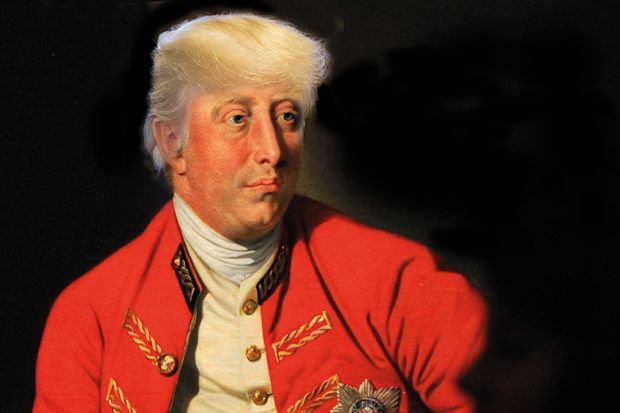What would Jane Austen say about Donald Trump? Easy to guess, for she had seen it all before. A Regency girl in a golden age of satire, she attacked the Prince of Wales for his much-lampooned appearance, his lewd licentiousness, his impatience for power, his volatile immaturity, his outrageous spending, his implicit treason, his vanity, his braggadocio, and his preference for spectacle, holidays and sport over responsibility.
Throughout her writing career, she kept close watch on the narcissistic prince. At a time when most people were poor and when black lives didn’t matter, his wish to become another sun king was dragging the country down. In 1813, she wrote that she hated him.
Austen was never more than a few degrees of separation away from the prince. When she was young, he lodged at Kempshot Manor, near Steventon, and her brother James went hunting with him. At the Wheatsheaf Inn, Basingstoke, where she and Cassandra collected the mail, he held riotous hunt club dinners. Walking back through those leafy lanes, they must have marvelled over the latest excesses of the boorish young man.
At Kempshot, the prince entertained his mistresses, held wild parties and reluctantly sired a daughter with Princess Caroline. His “very blackguard companions” were “constantly drunk and filthy, sleeping and snoring in boots on the sofa”, said the Earl of Minto. The scene, he said, “resembled a bad brothel much more than a palace”.
Austen was not prudish, but patriotic. She would satirise the prince through avatars – John Thorpe in Northanger Abbey, Tom Bertram and Henry Crawford in Mansfield Park, Frank Churchill in Emma, Sir Walter Elliot and William Walter Elliot in Persuasion. These lacerating portraits suggest close knowledge of his vulgar and selfish ways.
In Mansfield Park, Sir Thomas Bertram’s absence in Antigua, like the absence of the sick George III, allows his pleasure-loving son to take charge. Like the regent, he preoccupies himself with theatricalities and show, while in Emma, Churchill wastes time and money “at the idlest haunts in the kingdom”. Brighton, perhaps, the prince’s Mar-a-Lago.
Even court insiders declared the new regent unfit to rule. In 1811, he was widely mocked for spraining his ankle while teaching a courtier the Highland Fling. Overweight and overwrought, he went to bed for 10 days. Some said that he was avoiding hard decisions, others that he was going mad like his father. Austen once wrote, “How much are the poor to be pitied, & the rich to be blamed,” and in 1811, at a time of severe economic hardship, he had celebrated the inauguration of his regency in ludicrously opulent style. As Shelley warned, it would not be “the last bauble which the nation must buy to amuse this overgrown bantling of Regency”.
With instability at home and peril abroad, the regent spent the nation’s money on lavish building projects, supported dead Bourbons, hosted French royals and nobles in exile, bought up their gilded furniture for Carlton House, and planned a second Versailles at Buckingham Palace. To many, his actions amounted to treason, while others warned that he coveted the absolute power of Louis XIV, the Sun King. “The rising sun” went viral as code for the king’s son, as Austen well knew, for in Persuasion, Charles Musgrove refuses to meet Sir Walter Elliot’s heir, William Walter. “Don’t talk to me about heirs and representatives,” he cries. “I am not one who neglects the reigning power to bow to the rising sun.”
Sir Walter’s refusal to “retrench”, another code word for the regent, attacks his sense of entitlement, for Anne Elliot recommends “honesty against importance”, and Lady Russell rams the satire home by observing, “What will be doing, in fact, but what very many of our first families have done – or ought to do.”
Personal as well as patriotic reasons fuelled Austen’s loathing, for the prince had borrowed large sums from the Earl of Moira, who owed £6,000 to Jane’s brother, Henry. Lord Moira defaulted on his debts by sailing to India, and as Emma Clery explains in Jane Austen: The Banker’s Sister, Henry then became bankrupt. No wonder that Austen hated the regent.
Just before she died on 17 July 1817, Jane Austen wrote an odd little poem about the regent’s beloved Winchester races. Here St Swithin calls the “Lord & the Ladies” all “sattin’d & ermin’d” his “rebellious subjects”, rebukes them as “depraved”, rules that “By vice you’re enslaved/You have sinn’d & must suffer”, and vows to bring down rain on “these races & revels & dissolute measures/With which you’re debasing a neighbouring Plain”. It was the satirist’s last fling at a regent she knew to be dissolute, depraved and a danger to the nation. This savvy, brave and thoroughly modern woman would have plenty to say about Mr Trump.
Jocelyn Harris is emeritus professor at the University of Otago in Dunedin.
POSTSCRIPT:
Print headline: What would Austen say about Trump? Plenty
Register to continue
Why register?
- Registration is free and only takes a moment
- Once registered, you can read 3 articles a month
- Sign up for our newsletter
Subscribe
Or subscribe for unlimited access to:
- Unlimited access to news, views, insights & reviews
- Digital editions
- Digital access to THE’s university and college rankings analysis
Already registered or a current subscriber?






